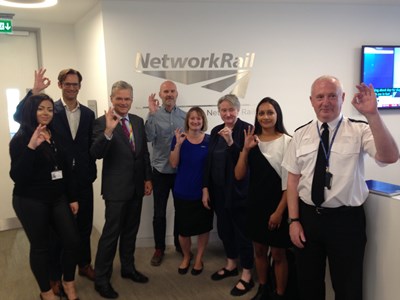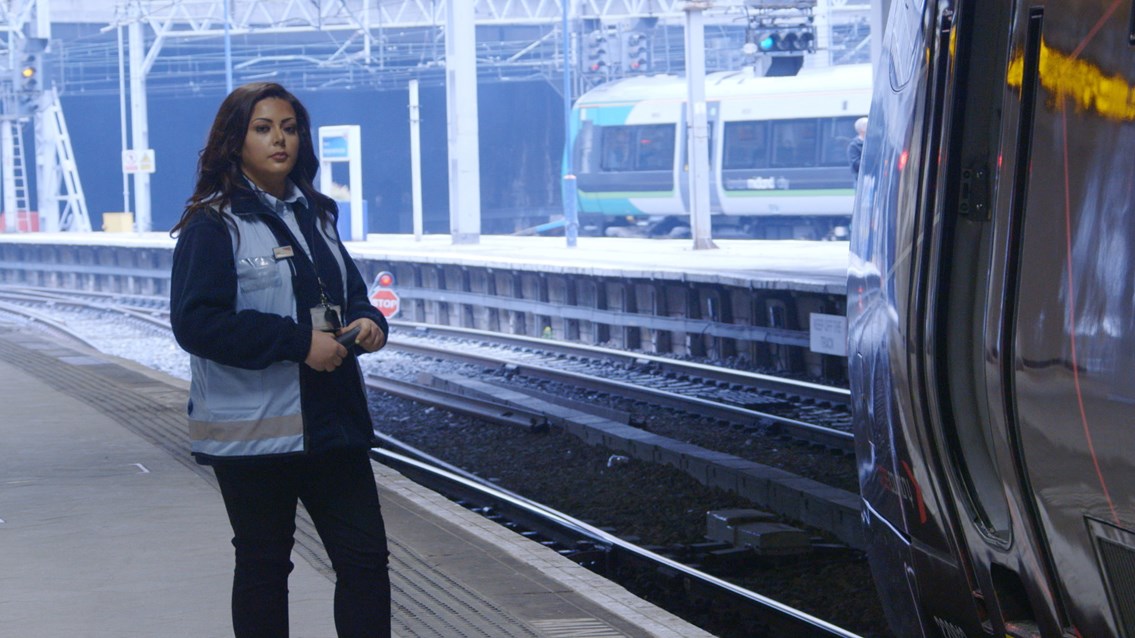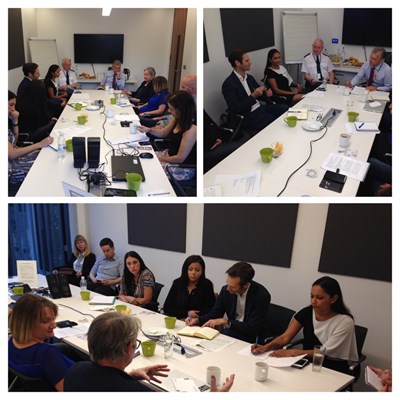Thursday 8 Sep 2016
Railway heroes save over 1,000 lives on Britain’s rail network in just a year
- Region & Route:
- National
- Network Rail hosts roundtable discussion with partner organisations to discuss how to further reduce suicide rates ahead of World Suicide Prevention Day
- Health Secretary commits an extra £1 billion in mental health services, which will benefit an additional one million people per year
Railway staff, police officers and members of the public have saved over 1,100 people in 2015/16 having intervened in potential suicide attempts on Britain’s railway.
Neena Naylor, a Network Rail train dispatcher at Birmingham New Street and a life-saver, said: “I suffered from depression and sought help but too many people, especially men, do not and find themselves at breaking point. Through the training I received from Samaritans, I intervened when I saw someone in distress at my station and played my part in helping save someone’s life. We can all be more vigilant and potentially make a life-saving difference if we try.”
It was revealed that in 2015/16, there were 252 suicides on Britain’s railway. While this represented a 12% reduction on the previous year, bucking the national trend, more needs to be done to tackle this modern day killer.
Timed to coincide with World Suicide Prevention Day, leaders from a number of organisations spearheading suicide prevention met at Network Rail’s London Euston headquarters to challenge the taboo that exists, particularly amongst men, of talking about suicide.
Highlighting suicide as the single biggest killer of UK men aged under 50, the group looked to review progress that the railway industry has made in tackling suicide, and commit to plans to reduce the number of suicides taking place on the railway by encouraging people to seek help.
Chairing the event, Network Rail’s chief executive and deputy chair of the Rail Delivery Group, Mark Carne said: “Any death on the railway is a tragedy which has a real emotional impact on the family and friends involved, and on our staff and customers. It’s a complex issue which the whole of society needs to work together to address.
“Men are three times more likely than women to die by suicide – it’s the single biggest killer of men aged under 50 in the UK. A large proportion of my 36,000-stong workforce are men and I want them to know its ok to talk – we must break down the taboo of talking about suicide. If anyone feels like they need support, it’s ok to ask for help.”
Health Secretary, Jeremy Hunt said: “I pay tribute to the dedicated staff of Network Rail who are leading the way in preventing suicide. As a country, we tragically lose 13 people to suicide every day, and nearly three quarters of those people had no contact with NHS mental health services in the previous year.
“Though we are making progress, as one of the first countries in the world to launch waiting times for mental health services, giving people a guarantee on how quickly they can expect to be seen, we want to go much further. Our plans will see a million more people benefiting from mental health services every year, with £1 billion of extra money being invested to ensure everyone can get the help they need.”
The roundtable was attended by representatives from; the Department of Health, British Transport Police, Samaritans, Campaign Against Living Miserably (CALM), Rethink, and Network Rail, who discussed ways to drive down suicide rates further, progress to date, and what could be done differently in future.

It was noted that for the first time in three years, there had been a reduction in the number of suicides taking place on the railway – 2015/16 saw 252 suicides/suspected suicides on the railway, 35 fewer than the previous year and a 12 per cent reduction.
But of those who took their own lives, 80 per cent were men.
Attendees of the roundtable recognised the railway industry’s support of the government’s 10 per cent reduction target in suicides by 2020/21. The group called for appropriate resources to be made available, increase the support offered to men, and for a commitment to share data and learnings across their organisations.
Brian Dow, director of Rethink Mental Illness, and co-chair of National Suicide Prevention Alliance (NSPA) said: “So many people have been affected by suicide, and so many brothers, sisters, parents and friends are missed. We urgently need to tackle this issue that is still claiming too many lives. There is something we can all do to help prevent it; even a simple conversation, asking how your mate is, can make a big difference. Of course this has to be supported by businesses, charities and government, the more we can work together, the more we can stop suicide.”
Through Network Rail’s partnership with the Samaritans, more than 11,000 rail staff and British Transport Police officers have been trained on Samaritans courses, giving them the skills and confidence to identify and approach vulnerable people on the railway and lead them to a safe place.
In addition, the National Suicide Prevention Alliance (NSPA) is working with its members, nearly 70 organisations across England including Network Rail, in a united push to mark World Suicide Prevention Day and encourage men to share their problems, emphasising the point that suffering in silence could be fatal, through its #ItsOkayToTalk campaign.
ENDS
The numbers:
- 11,000 rail staff and British Transport Police officers have been trained on Samaritans courses
- More than 1,100 prevented suicide attempts on the railway (2015/16)
- 252 suicides/suspected suicides on the railway (2015/16). That’s 35 fewer suicides than the previous year (12% reduction) and the first fall in three years
- The government has a target of a 10% reduction in suicides by 2020/21
- 80% of people who die by suicide on the railway are men
- Men are three and a half times more likely to take their own lives than women
- Suicide is the biggest single killer of men aged under 50 in the UK
- Only 28% of people who died by suicide in England between 2003 and 2013 were in contact with mental health services
- In 2015/16, 69 people (one in five) who attempted to take their lives on the railway survived. Most were left with life changing injuries
Social media
- Join the debate and use #ItsOkayToTalk on Twitter
Speakers at the roundtable included:
- Jonathon Marron – director of mental health, Department for Health
- Mark Carne – chief executive, Network Rail, and deputy chair of the Rail Delivery Group (RDG)
- Rachel Watters, suicide prevention, Network Rail
- Neena Naylor – train dispatcher, Network Rail
- Ken Young – chief inspector, British Transport Police
- Jane Powell – chief executive officer, Campaign Against Living Miserably (CALM)
- Brian Dow – director of Rethink Mental Illness, and co-chair of National Suicide Prevention Alliance (NSPA)
- Jacqui Morrissey – head of external affairs, Samaritans and co-chair of National Suicide Prevention Alliance (NSPA)
- Poorna Bell – executive editor, Huffington Post
Notes to editors:
- World Suicide Prevention Day is a day of action taking place this weekend, Saturday 10 September, intended to promote discussion, reduce stigma, and raise awareness that suicide can be prevented
- Network Rail is a member of the National Suicide Prevention Alliance (NSPA)
- Today (8 September) members of the National Suicide Prevention Alliance (NSPA) will be setting up a ‘Listening Village’ in Parliament Square to emphasise to MPs and the public that suicide is a serious issue and we can all do more to prevent it. A range of spokespeople, as well as those affected by suicide, will be available for interview, including Halifax rugby league player Luke Ambler, who founded the #ItsOkayToTalk campaign after his partner lost her brother to suicide. Members will be talking to the public and distributing specially designed leaflets encouraging people to seek help if they’re struggling to cope, and offering a listening ear to anybody that might need it.
- The National Suicide Prevention Alliance (NSPA) is a cross-sector, England-wide coalition committed to reducing the number of suicides in England, and improving support for those bereaved or affected by suicide.
Contact information
Passengers / community members
Network Rail national helpline
03457 11 41 41
Latest travel advice
Please visit National Rail Enquiries
Journalists
Network Rail press office - National
020 3356 8700
mediarelations@networkrail.co.uk
About Network Rail
We own, operate and develop Britain's railway infrastructure; that's 20,000 miles of track, 30,000 bridges, tunnels and viaducts and the thousands of signals, level crossings and stations. We run 20 of the UK's largest stations while all the others, over 2,500, are run by the country's train operating companies.
Usually, there are almost five million journeys made in the UK and over 600 freight trains run on the network. People depend on Britain's railway for their daily commute, to visit friends and loved ones and to get them home safe every day. Our role is to deliver a safe and reliable railway, so we carefully manage and deliver thousands of projects every year that form part of the multi-billion pound Railway Upgrade Plan, to grow and expand the nation's railway network to respond to the tremendous growth and demand the railway has experienced - a doubling of passenger journeys over the past 20 years.
Follow us on Twitter: @networkrail
Visit our online newsroom: www.networkrailmediacentre.co.uk


